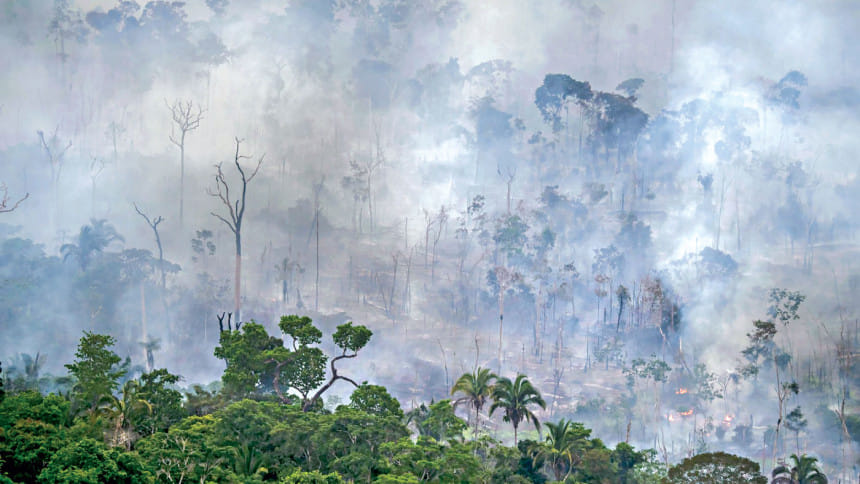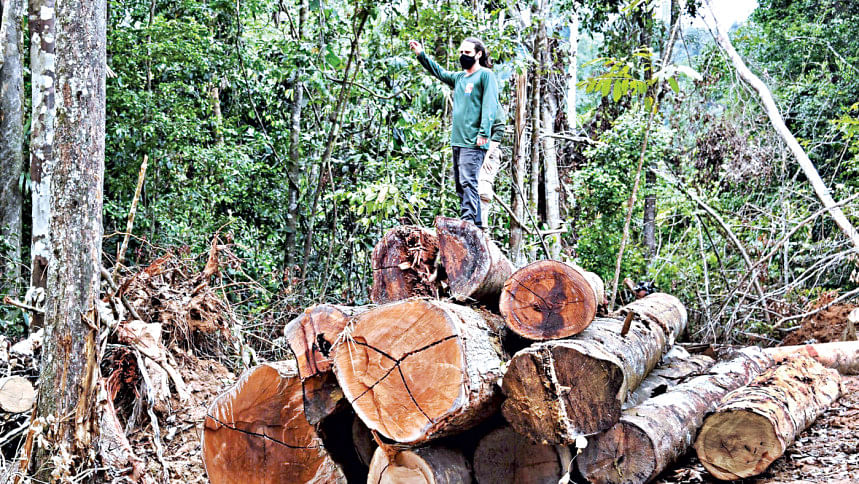The ‘lungs of the Earth’ dying

Something is wrong.
Holed up in her lab, Brazilian atmospheric chemist Luciana Gatti crunches her numbers again and again, thinking there is a mistake.
But the same bleak conclusion keeps popping up on her screen: the Amazon, the world's biggest rainforest -- the "lungs of the Earth," the "green ocean," the thing humanity is counting on to inhale our pollution and save us from the mess we've made of the planet -- is now emitting more carbon than it absorbs.
Splashed across South America in an exuberant blob of deep green, the Amazon basin is one of the world's great wildernesses, a place where life teems in the heat of the tropics, fed by the myriad rivers criss-crossing the jungle like blue blood vessels.
Home to more than three million species, the rainforest bursts with lush vegetation, which absorbs huge amounts of carbon through photosynthesis -- a key fact as humankind struggles to stop heating the planet with greenhouse gases.
As carbon dioxide emissions have surged by 50 percent in 60 years, to nearly 40 billion tonnes worldwide, the Amazon has absorbed a large amount of that pollution -- nearly two billion tonnes a year, until recently.

But humans have also spent the past half-century tearing down and burning whole swathes of the Amazon to make way for cattle ranches and farmland.
Gatti, who works at Brazil's national space agency, has been tracking how much carbon the region emits and absorbs, watching for signs of a looming nightmare: that the destruction could push the Amazon to a "tipping point" where much of the rainforest dries up and turns to savannah.
Climate scientists say passing that point would be catastrophic: instead of helping curb climate change, the Amazon would suddenly accelerate it. Plummeting rainfall would cause its trees to die off en masse, releasing up to a decade's worth of worldwide carbon emissions back into the atmosphere -- and dooming our efforts to hold global warming somewhere near a livable limit.
In July, Gatti and her team published their grimmest findings yet, in the journal Nature.
First: the Amazon is now a net carbon source, mainly because of humans setting it on fire. Second: even subtracting emissions caused by fires, the southeastern Amazon is now a net carbon emitter.
Gatti's is one of several recent studies to sound a blaring alarm on the Amazon. It is based on data from 2010 to 2018.
Since then, the destruction has accelerated -- especially in Brazil, home to 60 percent of the Amazon, where far-right President Jair Bolsonaro took office in 2019 with strong backing from the farm lobby, pushing to open protected lands and indigenous reservations to agribusiness and mining.
Under Bolsonaro, deforestation in the Brazilian Amazon has surged from an average of 6,500 square kilometers per year during the previous decade to around 10,000 -- an area nearly the size of Lebanon.
Scientists say it is impossible to be sure just how close the rainforest now is to the tipping point. But Gatti's findings suggest we are teetering on the brink -- if not tumbling over it already, at least in part of the Amazon.
According to one widely cited study, the Amazon will reach the tipping point when 20 to 25 percent of it is deforested. We are currently at 15 percent -- up from six percent in 1985.
Of course blame for the Amazon's degraded state goes beyond Bolsonaro, and Brazil. Gatti, the atmospheric chemist, argues the whole world bears responsibility.
Illegal Amazon timber is exported to the United States and Europe. Massive quantities of beef produced on razed rainforest are shipped around the world. Soy grown in the Amazon helps feed cows, chickens and pigs across the globe.
Governments should ban those imports, Gatti says.
"If you want to protect the Amazon, stop consuming the products that fuel its destruction."
Erika Berenguer, an Amazon ecologist at Oxford and Lancaster universities, is one of the most prominent scientists studying how the rainforest functions when humans throw it off balance.
"That's the million-dollar question," she said when asked about the tipping point of Amazon.
"We'll never know the tipping point until we're past it. That's the definition of a tipping point. … If we pass the tipping point, it's the end. And I don't say that lightly. We're talking about the most biodiverse place on the planet collapsing," she said adding millions and millions people in Brazil and billions around the world will be affected.
"We cannot live in a world without the Amazon."

 For all latest news, follow The Daily Star's Google News channel.
For all latest news, follow The Daily Star's Google News channel. 



Comments